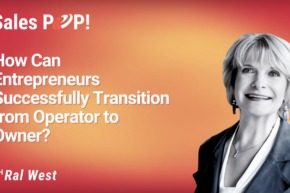Sales coaching is at a crossroads. Despite new tools and technologies, many organizations still struggle to unlock the full potential of their sales teams. In a recent episode of Sales POP!, host John Golden sat down with Dr. Deepak Bhootra, CEO and founder of Jabulani Consulting, to dissect the real challenges and transformative strategies in sales coaching today. Drawing on over 30 years of global sales and leadership experience, Dr. Bhootra offers a masterclass in moving beyond outdated methods to create high-performing, resilient sales teams.
This in-depth post distills the episode’s key insights, offering actionable advice and expert recommendations for sales leaders, managers, and professionals seeking to elevate their coaching skills.
1. The Real Challenges in Sales Coaching
Key Issues Identified:
- Lack of Formal Training: Most sales managers have not received formal training on how to coach effectively.
- Ego and Vulnerability: 80% of sales managers believe they don’t need coaching themselves, fearing it undermines their authority.
- Outdated Methods: Many still rely on transactional activities (call reviews, ride-alongs) that focus on closing deals, rather than developing people.
Expert Insight:
Dr. Bhootra likens the resistance to coaching in sales to the difference between elite athletes and average professionals. While top athletes seek constant feedback, many sales leaders view coaching as a one-way street, missing out on growth opportunities.
Actionable Advice:
- Acknowledge the gap: Recognize that coaching is a skill requiring training and humility.
- Model vulnerability: Leaders should seek coaching themselves, setting a tone of continuous improvement.
2. Mindset Shifts: From Judgment to Empathy
The Problem:
Traditional sales coaching is often judgmental, focusing on what reps did wrong. This fosters a culture of inspection, rather than support.
The Solution:
Shift from a “fixing” mindset to one of empathy and belief-building.
How to Do It:
- Ask personal, not just deal-centric, questions:
- Instead of “What’s wrong with the deal?” ask “What’s going on with you?”
- Listen for subtle signals:
- Silence, disengagement, or superficial CRM updates may indicate burnout or more significant underlying issues.
- Practice the “two-to-one” listening ratio:
- Listen twice as much as you speak to understand your reps truly.
Expert Tip:
Empathy in coaching is like a reassuring touch—it helps people feel heard and supported, which is essential for motivation and retention.
3. Structured Coaching: Beyond Technique
Common Pitfall:
Most managers focus disproportionately on sales technique, neglecting behavior and attitude.
Dr. Bhootra’s Framework:
- Technique: The “how” of selling.
- Behavior: The “what” reps do.
- Attitude: The “why” behind their actions.
Why It Matters:
Focusing only on technique ignores the underlying drivers of performance. Sustainable improvement comes from nurturing all three areas.
Action Steps:
- Balance your coaching:
- Address not just skills, but also mindset and daily habits.
Use positive language:
- Frame feedback around potential and growth, not just errors.
4. Discovery Techniques for Internal Coaching
Game-Changer:
Apply the same discovery methods used with customers to coaching conversations with your team.
How to Implement:
Use SPIN Selling Framework Internally:
Situation: “What’s working well for you right now?”
Problem: “What’s not working or feels unexpectedly hard?”
Implication: “How is this impacting your results or motivation?”
Need-Payoff: “What support or change would help you move forward?”
Benefits:
Encourages honest dialogue.
Uncovers root causes of challenges.
Empowers reps to co-create solutions.
Expert Example:
A sales VP skilled in customer discovery realized he’d never used those same open-ended questions with his team. The shift led to more in-depth and productive coaching conversations.
5. Focusing on the Middle 50%: The Untapped Goldmine
The Mistake:
Leaders often focus on top performers (to “milk” more results) or low performers (to “fix” them), neglecting the middle 50%.
Why the Middle Matters:
The middle group is often on the cusp of greatness.
Small improvements here can drive significant overall results.
Actionable Strategies:
Invest coaching time in the middle:
- Identify reps who are close to quota or showing potential.
Set incremental goals:
- Help them achieve the next 10-20% improvement.
Celebrate progress:
- Recognize and reward positive behaviors, not just outcomes.
Metaphor:
Don’t just “squeeze the cow” (top performers); “feed the herd” (middle performers) to grow your overall results.
6. Celebrating Wins and Building Belief
Human Nature:
People are wired to notice mistakes more than successes, leading to a culture of criticism.
The Fix:
Actively recognize and celebrate small wins and positive behaviors.
Practical Techniques:
- Reference past successes:
- “Remember how you handled the Jepsen deal? Let’s try that approach again.”
- Encourage self-reflection:
- Ask reps to identify what’s working for them.
- Make recognition public:
- Share wins in team meetings or internal communications.
Why It Works:
People rarely argue with their ideas. By reminding reps of their strengths, you foster ownership and motivation.
7. Integrating AI: Augment, Don’t Replace
Current Pitfall:
Many organizations use AI as a surveillance tool or “scorekeeper,” which can feel punitive and erode trust.
Best Practice:
Use AI as “augmented intelligence” to empower, not micromanage, your team.
How to Leverage AI Effectively:
- Support, don’t surveil:
- Use AI to provide insights and context, not just monitor activity.
- Empower reps:
- Let salespeople use AI for low-risk tasks (e.g., email drafting, summarizing calls) and gradually build trust for higher-stakes applications.
- Mirror, not judge:
- AI should reflect performance to the rep, who can interpret it with their manager’s support.
Expert Warning:
AI is only as effective as the human context in which it’s used. Don’t let technology replace the nuanced judgment of experienced salespeople.
8. Coaching for Longevity and Mental Health
The Reality:
Sales is a high-pressure, high-turnover profession. 35% of salespeople leave by age 35, often due to lack of support and belief from leadership.
What Works:
- Prioritize mental health:
- Recognize signs of burnout and proactively offer support.
- Use positive, supportive language:
- Instead of punishing reps for missing targets, focus on how to help them close the gap.
- Invest in coaching as a career asset:
- Encourage reps to view coaching as essential to their professional growth, just like athletes invest in training.
Personal Story:
Dr. Bhootra shared how a high-performing rep left after being put on a performance improvement plan despite being at 93% of target. The lesson: belief and support are more motivating than pressure and punishment.
9. Actionable Takeaways for Sales Leaders
To transform your sales coaching, start here:
- Get trained in coaching skills.
Don’t assume you know how—seek out formal training and mentorship. - Model vulnerability and continuous learning.
Show your team that everyone, including leaders, can benefit from coaching. - Shift from judgment to empathy.
Make your coaching conversations about the person, not just the pipeline. - Balance focus on technique, behavior, and attitude.
Sustainable change comes from nurturing all three. - Apply discovery techniques internally.
Use open-ended questions to uncover real challenges and motivations. - Invest in the middle 50%.
Small improvements here can yield significant results. - Celebrate wins and reinforce strengths.
Build belief and motivation by recognizing progress.
Our Host
John is the Amazon bestselling author of Winning the Battle for Sales: Lessons on Closing Every Deal from the World’s Greatest Military Victories and Social Upheaval: How to Win at Social Selling. A globally acknowledged Sales & Marketing thought leader, speaker, and strategist, he has conducted over 1500 video interviews of thought leaders for Sales POP! online sales magazine & YouTube Channel and for audio podcast channels where Sales POP! is rated in the top 2% of most popular shows out of 3,320,580 podcasts globally, ranked by Listen Score. He is CSMO at Pipeliner CRM. In his spare time, John is an avid Martial Artist.








Comments